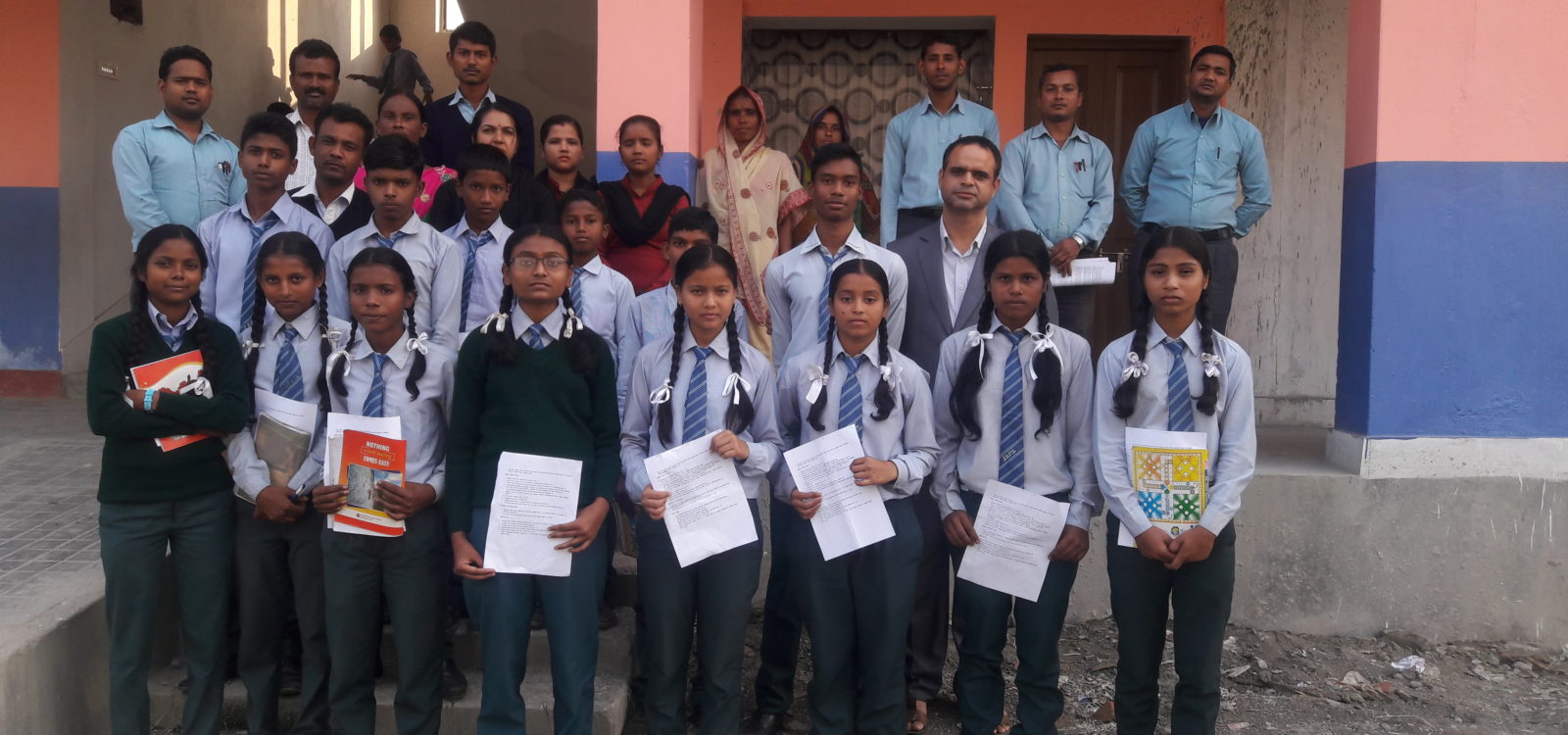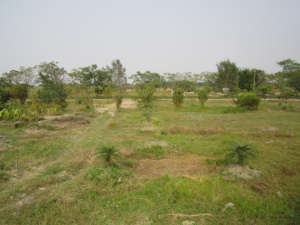
Introduction
Jeevan Bikas Samaj is implementing various development programs beside its microfinance program. Although microfinance program is the backbone of the organization, JBS is operating plus program in the society for community development. To develop back warded village as a healthy village, JBS has been performing its community development activities in various areas like environment conservation, health, education, clean energy, peace and democracy, advocacy, gender, sanitation, agriculture, biodiversity conservation and many more.
1. Jeevan Bikas Park
JBS is manufacturing a community park covering an area of 21 Bigha at Kadmaha VDC of Morang district. Establishment of multipurpose nursery and plantation of agro-forestry blocks, vegetable farming, organic farming practice, fishpond, and cow farm are major activities under it. JBS has been establishing a bamboo nursery, Bamboo Treatment Center in the park with the financial and technical support of Habitat for Humanity Nepal.
On the park, it has different kind of plant categories such as fruits plants, flowering and non-flowering plants, indigenous plants, indoor and outdoor plants, highly endangered plants, medically demanded plants and so on. JBS has been planning to recognize Morang district as a green zone, therefore it has been planting different kind of plants on roadside, school and on public places.
2. Bamboo plantation program
Bamboo is popular for it’s significant to reduce global warming and to generate oxygen. Bamboo has a historical and cultural connection in Nepal; it is used in almost all aspects of life from construction, marriage, death to livelihood. Nepal is endowed with more than 6000 species of flowering plants including 30 bamboo species. With the growing bamboo demand in the world, abundant availability of the resources, vast traditional knowledgebase and cultural affinity of this material in Nepal, there is a tremendous potential for it to contribute to the people’s livelihood. Bamboos can be used for house construction and have greater strength properties. Bamboos are being used by poor people for house construction, fencing works and also used for scaffolding works by constructors of buildings, dams etc. Bamboos are also exported to India where there is greater demand of bamboos for scaffolding works, house construction and paper manufacture. The main objective of the project is to reduce the land degradation situation by the flow of river water. Bamboo is particularly useful in preventing soil erosion, as the interlocking rhizomes keep saturated topsoil firmly in place. Planting on steep riverbanks can reduce damage during floods, landslides and earthquakes. The major objectives of the project are to reduce the soil erosion, flood and control the land degradation, aware local community about the impact of land degradation and soil erosion, mobilize local community in bamboo conservation activities, formulate Bamboo Conservation group and aware people about the importance of bamboos.
Jeevan Bikas Samaj (JBS) has already established a Bamboo Nursery on the bank of Ratuwa River at Mahadeva VDC of Morang district which lies in Jeevan Bikas Park. Till six month of period JBS has planted more than 5000 bamboo plant on the project area.
3. Livelihood Development Program
JBS has been implementing a livelihood support program in Babiyabirta and Sorabhag VDCs of Morang District. The project aims to provide technical support about vegetable farming for marginal farmers, the landless, dalits and ethnics. The project will be a bridge to expose the target groups with CADP, CAA and other service providers. The objectives of the project are to improve the livelihoods of the rural poor in the agriculture sector, to increase their participation in the development process, to increase their incomes, and to enhance skills for effective participation in development efforts. JBS has formulated 23 self-help groups and mobilized them. In the 3 years project period, 600 HHs are benefited by different level of vegetable farming training, technical support, hybrid seeds, fertilizer and so on. On the other hand, JBS has also identified illiterate women at the project area and provided them non-formal education. JBS assists to the beneficiaries in social mobilization, adult literacy, income generation and marketing activities and in sustainable agriculture development activities.
4. Natural Disaster Preparedness and Mitigation Program
To sensitize rural backward people about the distress of flood and fire is the core objective of the program. This program is being implemented in Katahari and Thalaha VDCs of Morang district, situated on the bank of Lohandra River. Every monsoon, the river transforms into violent form and affect the residences and other physical infrastructures. The program aims to diminish the affect of natural disaster (i.e. flooding in summer and fire in dry season) in the project area. To implement the program, the local people has formed a nine member’s Coordination Committee that is actively performing its assignment to complete the program. They have also formed some supporting committees for efficient work such as Embankment Construction Committee, Bamboo Plantation Committee and Conflict Resolution Committee etc. Local people are actively participated to build embankment on the river. On the other hand, JBS has exposed a street drama named Hosiyar (Beware) in different places of Katahari and Thalaha VDCs of Morang district. The street drama is aimed to improve the level of awareness about fire and flood. In this program, JBS has empowered local people to build improved cook stove. So far, JBS has disseminated more than 60 improved cook stoves in the projected area. Along with the stoves, it has promoted kitchen management practices, which effetely contribute to reduce indoor air pollution. Currently, it is promoting improved cook stoves in Katahari VDC of Morang District. The improved cook stoves currently being promoted are constructed on site. It is supporting to aware local people, which has to be promoted at community and at household level.
5. Enhancing Access to Financial Service Project
Nepal Rastra Bank, UNDP and UNCDF are supporting in increasing access to financial services in the remote and unserved areas of Nepal. The Project intends to enhance access to financial services and the use of formal financial services particularly by poor youth and excluded groups in a sustainable manner. JBS has been implementing the project collaborating with Nepal Rastra Bank, UNDP and UNCDF to enhance its financial services for marginalized poor people. To execute, project objectives JBS has extend its program in hill districts i.e. Illam, Dhankuta, Udayapur and Sindhuli districts. JBS has been succeeded to achieve the goal of the project. It has been reaching in the remote area with high inspiration to extend its services in remote hill and mountain, focusing financial service accessibility.
6. Housing for Poor (Arthpurna Jeevan ko Lagi Aawas)
In Nepal, as in many parts of the world, low-income families are generally excluded from housing finance by formal financial institutions. That is beginning to change in seven southeast districts, where Jeevan Bikas Samaj, has been playing a vital role in addressing poverty-related issues through sustainable microfinance and social enterprise. Jeevan Bikas Samaj has been providing housing loan service for those poor people who have not prime house to live. JBS initiated housing microfinance specifically incorporating sustainable building using locally available, environmentally sustainable construction materials.
JBS has been promoting pre-fabricated bamboo houses in its working area. In eastern Nepal, bamboo is the predominant building material and affordable for the poor. Bamboo is fast growing, easy to use, environmentally friendly and durable. Typically, the bamboo is chemically treated, cut to size and sent to various construction sites where it can be assembled. Houses built with such bamboo can be completed within seven days and last for many years.
Habitat for Humanity Nepal is playing vital role to support JBS by technically as well as financially, this effort has forced JBS to do more for low-income families to improve their housing condition. Till the end of FY 2014/15, about 26,085 households has been benefited by the housing program of JBS.
Housing for Poor program has been recognizing all over the world, national and international volunteers are interested to work for poor as a volunteer labor in house build activities. JBS has hosted number of native/foreign volunteers who wants to work for poor in Nepal. Nepal has traditionally been a favorite destination for Global Village volunteer teams. It has hosted volunteers from Australia, America, Canada, Japan, New Zealand, England, Denmark, USA and many other countries, who have contributed as volunteer labor on housing builds.
7. Fund Board (Safe drinking water and sanitation) program
JBS has been initiating a project for sustainable health and hygiene services through improvement in water supply and sanitation awareness, coordinating with Rural Water Supply and Sanitation Fund Development Board (RWSSFDB). In rural area, women’s shoulder the burden of managing the total water demand of a household. Disparity on traditionally prevailing gender role has continuously forcing them to fetch water, take care of laundry, wash dishes, clean house, prepare meals, rare and care children as well as often be a helping hand on farming. As a primary actor of water and sanitation, the role of woman in the project is enhanced through active participation in all aspects and activities, including in decision-making process. Ultimate goal of JBS in this project is to improve the health of communities through bringing potable water closer to their homes and promoting hygiene and sanitation activities. To continue the better hygiene and sanitation practices of a community, it ensure at all levels of project cycle a technically, environmentally and operationally sustainable water supply system. During the FY 2014/15, total 878 households were able to get benefit from the program.
